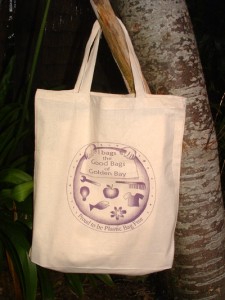Kāpiti Coast’s Greenest Street: The Bag Lady
It can be nice to be remembered in your local supermarket, but for Doreen Douglas it was a case of “Oh, you’re the one with the bag!” Doreen was taking her own cloth bags to the shops well before it became fashionable. Today she’s delighted by the number of shop assistants who ask if she wants a disposable bag. Interestingly, she says there are other ‘green’ things she does that still make her “weird”. Case in point is her aversion to wheelie bins, but I digress.
Doreen and her husband Stuart have lived in Avion Terrace, Raumati Beach, for two years. They are part of the stalwart group of retirees driving the Terrace’s entry in the Kapiti Coast District Council’s Greenest Street competition. Having moved from Paramata they “love, love, love it [here]”. Not only is the climate better, but living on the flat means they meet more people out walking. They say the Terrace is a lovely street – “like a little village” – with walking and cycle paths around the nearby airport (they have been known to cycle, but are reluctant to describe themselves as ‘cyclists’). The nearby beach doubles as a footpath to the shops.
Avion Terrace is a relatively new cul-de-sac populated with modern houses. Their entry in the Greenest Streets competition was the result of an advertisement in the local newspaper that caught the interest of themselves and their equally ‘green’ neighbours. This leads to an interesting discussion of what it means to be ‘green’: Doreen tells me there’s a perception that a modern house isn’t green, but she points out that they are well-insulated. This was a major criteria when they were looking for a new home. Stuart goes on to explain that while the prevalence of concrete may not look especially green, in addition to insulation, it is built to face the sun, and passively heated by the concrete floor and tiles.
Getting onto the subject at hand – Doreen’s enthusiasm for her reusable bags – she and Stuart remember how everyone’s mother had their own shopping bag when they were growing up (casting back through my own memories I can picture two bags of my mother’s that seemed to go everywhere and contain everything). With the advent of supermarkets and increased car ownership however, disposable bags have become ubiquitous.
They do keep a bag in the car but, like many of us, frequently find themselves at the checkout without it. A small foldable bag in Doreen’s handbag has solved the problem. Doreen’s actually a bit of a connoisseur when it comes to bags for your handbag: we agree that the nylon ones with the domes on the bottom have a funny habit of spiraling their way undone if you don’t fold them right, and anything but nylon or silk is just too bulky. For those bigger planned shops, they keep a crate in the boot of the car.
Having been an oddity in this respect for many years, Doreen is pleased to see progress. She especially notes the complete turnabout done by The Warehouse, who have moved from giving away plastic bags to both charging for them and taking back packaging for recycling. We rack our brains to think of other businesses who have adopted a similar line, but struggle until Stuart points out that Pak n’Save have charged for bags for longer than any of us can remember.
This segues into an interesting discussion about the way availability influences behavior – just as offering plastic bags encourages people to use them, Doreen believes the prevalence of large wheelie bins encourages people to put lots of rubbish out, especially as the fullness of your bin doesn’t effect the price you pay. This is her current hobby-horse, she says.
Members of Avion Terrace and other competing streets will be at the Sustainable Home & Garden Show, 26/27 March. You can talk to them about their exploits, be guided through your own environmental footprint, and consider entering you and your neighbours in the 2011/12 round. Doreen also hopes to have reusable bags for sale.
For more information on disposable bags and packaging , the following sites are worth a look:
Plastic Bag Free is the site of the Golden Bay Bag Ladies, the force behind Collingwood becoming NZ’s first plastic-bag-free town.
The Bags Not! campaign sought to make Waitakere City plastic-bag-free. Their website has useful information on avoiding plastic bag usage and using and sourcing more environmentally-friendly options. It also has interesting facts and figures and examples of successful campaigns in communities, cities and countries around the world.
Rubbishfree have lots of good suggestions for avoiding rubbish, including plastic bags. They also sell reusable grocery and vegetable bags and rubbish-free shopping kits.
Or you can make your own bags using this pattern.
Take stand against packaging with Unpackit. Nominations are currently open for the best and worst packaging in the 2011 Unpackit Packaging Awards.
Stacey Gasson is the Sustainable Communities Coordinator with Kāpiti Coast District Council and one of the organisers of the ‘Greenest Streets’ competition. This blog is part of series profiling participating households and their projects.
loading...
loading...
Tags: green




Voices of our community